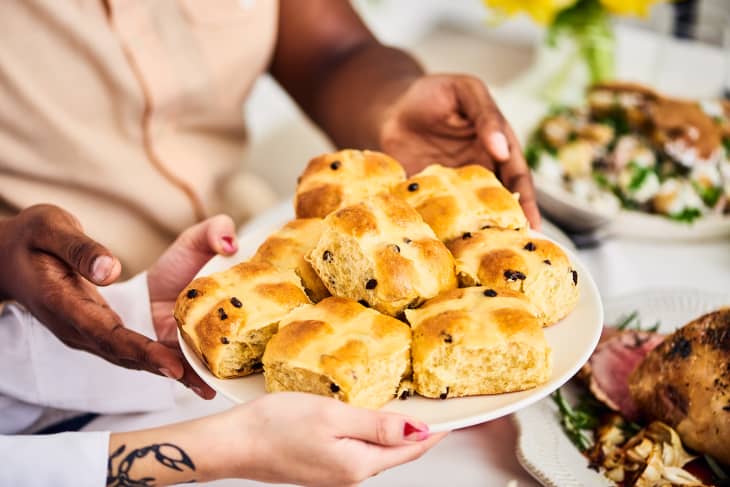Here’s Why We Eat Hot Cross Buns at Easter
When I think about Easter, there are a number of foods that immediately come to mind. They include hard-boiled eggs, ham, and roast leg of lamb, not to mention jelly beans, Peeps, and Cadbury eggs. But above all else, the one thing that stands out as the food of the season is hot cross buns.
Growing up I could always count on my mom to bring home a fresh package of hot cross buns, the second they hit the shelves. Over time I came to learn the tradition behind this seasonal sweet.
What Exactly Are Hot Cross Buns?
A traditional hot cross bun is a yeasted sweet bun that’s lightly spiced and studded with raisins or currants, then marked on top with a cross that’s either piped in icing or etched into the dough.
While hot cross buns are now sold and enjoyed throughout the year, they were once reserved for Good Friday alone.
Make hot cross buns! How To Make Hot Cross Buns
There isn’t one clear explanation for why hot cross buns make their way to our table around Easter. Some theories rest in Christian symbolism, though there are several stories (and even some tall tales) about their origins. Some talk about hot cross buns (which may have at one time been called Good Friday buns) being baked and eaten solely on Good Friday, while others mentioned them being eaten throughout Lent.
Here are a few of the stories that are told about hot cross buns.
1. A 12th-century monk introduced the cross to the bun.
The origins of hot cross buns may go back as far as the 12th century. According to the story, an Anglican monk baked the buns and marked them with a cross in honor of Good Friday. Over time they gained popularity, and eventually became a symbol of Easter weekend.
2. Hot cross buns gained popularity in Elizabethan England.
Towards the end of the 16th century, Queen Elizabeth I passed a law limiting the sale of sweet buns to funerals, Christmas, and the Friday before Easter. The English were deeply superstitious, believed the buns carried medicinal or magical properties, and were fearful of those powers being abused. Some even believed that buns baked on Good Friday would never go stale.
As a way to get around the law, more and more people began baking these sweet buns at home. Not only did they grow in popularity, but the law became too difficult to enforce and was eventually rescinded.
3. Superstitions about hot cross buns baked on Good Friday.
There are also more than a few stories that indicate hot cross buns were baked on Good Friday for superstitious reasons. One tale states that buns baked on this day and hung from the rafters of a home would ward off evil spirits in the coming year. Another talks of these buns protecting sailors from shipwreck, while off at sea. Yet another version mentions that sharing the bun with a loved one guarantees friendship in the coming year.
Do you eat hot cross buns at Easter? Have you ever tried making your own?
